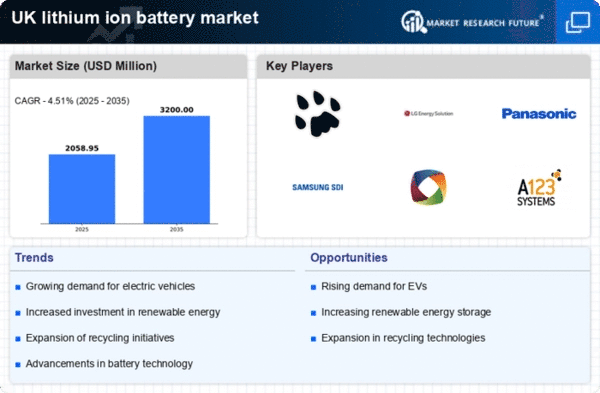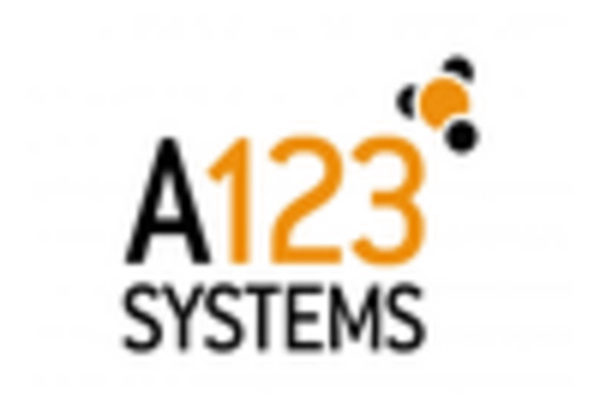Expansion of Consumer Electronics
The expansion of consumer electronics in the UK is significantly driving the lithium ion-battery market. With the proliferation of smartphones, laptops, and wearable devices, the demand for high-performance batteries is escalating. In 2025, the consumer electronics sector is projected to grow by 15%, further intensifying the need for advanced lithium ion batteries. These batteries are preferred for their lightweight, high energy density, and long cycle life, making them ideal for portable devices. As manufacturers seek to enhance device performance and battery longevity, the lithium ion-battery market is likely to see increased investments in research and development. This trend suggests a robust growth trajectory for the market, as consumer preferences continue to evolve towards more efficient and durable battery solutions.
Growth of Electric Public Transport
The growth of electric public transport systems in the UK is emerging as a significant driver for the lithium ion-battery market. With cities aiming to reduce air pollution and enhance urban mobility, electric buses and trains are being deployed at an increasing rate. In 2025, the UK government has committed to investing £1 billion in electric public transport initiatives, which is expected to lead to a substantial rise in demand for lithium ion batteries. These batteries are essential for powering electric vehicles, providing the necessary range and efficiency. As public transport electrification progresses, the lithium ion-battery market is likely to experience robust growth, aligning with broader sustainability goals.
Surge in Renewable Energy Integration
The lithium ion battery market is experiencing a notable surge due to the increasing integration of renewable energy sources in the UK. As the government aims to achieve net-zero emissions by 2050, the demand for energy storage solutions is rising. Lithium ion batteries play a crucial role in storing energy generated from solar and wind sources, which are inherently intermittent. In 2025, the UK has seen a 30% increase in renewable energy capacity, necessitating efficient storage systems. This trend indicates a growing reliance on lithium ion technology to balance supply and demand, thereby enhancing grid stability. The lithium ion-battery market is poised to benefit from this shift, as energy storage becomes essential for a sustainable energy future.
Rising Demand for Energy Storage Systems
The rising demand for energy storage systems in the UK is significantly influencing the lithium ion-battery market. As businesses and households seek to optimize energy usage and reduce costs, the adoption of energy storage solutions is becoming more prevalent. In 2025, the market for energy storage systems is expected to grow by 25%, driven by advancements in lithium ion technology. These systems enable users to store excess energy generated during peak production times for later use, enhancing energy efficiency. The lithium ion battery market is likely to benefit from this trend, as these batteries are increasingly recognized for their reliability and performance in energy storage applications.
Government Incentives for Battery Production
Government incentives aimed at boosting domestic battery production are playing a pivotal role in the lithium ion-battery market. The UK government has introduced various initiatives to support local manufacturing, including grants and tax breaks for companies investing in battery technology. In 2025, the government allocated £500 million to enhance battery production capabilities, which is expected to create thousands of jobs and stimulate economic growth. This strategic focus on local production not only reduces reliance on imports but also fosters innovation within the lithium ion-battery market. As a result, the market is likely to witness an increase in competitive offerings, driving down costs and improving battery technologies.















